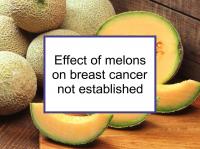By melons, we mean cantaloupe (or muskmelon), honeydew and crenshaw melons. Also in this group (known as winter melons) are casaba, Santa Claus (Christmas), Persian and Juan Canary (canary) melons; watermelon is covered in another webpage. Melons are generally a good dietary source of vitamin C and contain some cucurbitacins.
Melons have been found to be associated with lower risks of gallbladder, thyroid, and colon cancer. Maternal consumption of cantaloupe is associated with lower risk of childhood leukemia in children.
Breast cancer-related effects of eating melons
Consumption of the watermelon, papaya and cantaloupe (taken together) was found to be associated with lower risk of breast cancer in one study of Chinese women. Melons have been shown to have antioxidant and anti-inflammatory properties, although less powerful than many other fruits. Cantaloupes are a good source of alpha-carotene and beta-carotene.
A Scandinavian study found that dietary (but not supplemental) beta-carotene had a protective effect against lobular breast cancer in postmenopausal women. Another European study reported that high intake of beta-carotene was protective against breast cancer in postmenopausal women using hormone replacement therapy (HRT). The same study also found that dietary beta-carotene was associated with lowered risk of breast cancer in postmenopausal women with relatively high alcohol consumption. In addition, treatment with beta-carotene has been shown to reduce cardiotoxicity induced by the chemotherapy drug cisplatin in rats.
Dietary carotenoids have been found to inhibit the cancer-promoting effects of both estradiol and genistein (a phytoestrogen found in soy), thereby reducing their harmful effects in hormone-dependent breast cancer.
Additional comments
Bitter melon (Momordica charantia) or bitter gourd, used in Asian cuisines, is related to common melon. The fruit is very bitter, as the name implies. This bitterness appears to give it medicinal properties, including anti-cancer activities. Extracts of bitter melon have been shown to inhibit proliferation and induce apoptosis in breast cancer cells. However, one 2019 study reported that feeding an extract of dried bitter melon fruits increased the pro-cancerous effect of a chemical carcinogen in a rat model of breast cancer.
Melons should be washed before using to prevent a transfer of pesticides and other contaminants to the flesh during cutting.
Sources of information provided in this webpage
The information above, which is updated continually as new research becomes available, has been developed based solely on the results of academic studies. Clicking on any of the underlined terms will take you to its tag or webpage, which contain more extensive information.
Below are links to 20 recent studies concerning this type of food and its components. For a more complete list of studies, please click on melon.
